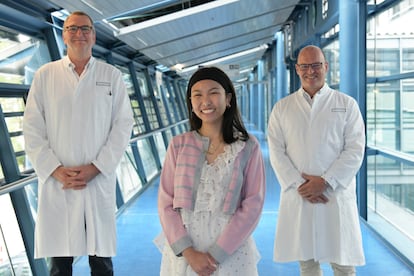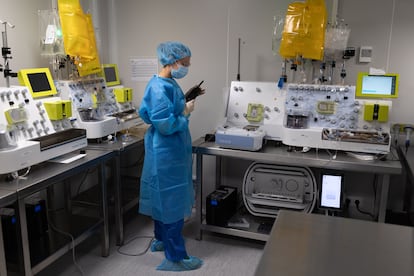Revolutionary experimental treatment achieves remission of lupus in five patients
The therapy, called CAR-T, has already proven effective at completely curing people with blood cancer, but it is costly

An expensive experimental treatment has managed to achieve hundreds of complete remissions of blood tumors, including leukemias, lymphomas and myelomas. The therapy, called CAR-T (chimeric antigen receptor T-cell therapy), involves extracting blood from patients, modifying white blood cells through genetic engineering and returning them to the body with an increased capacity to attack and destroy cancer cells. A team led by German doctor Georg Schett has employed the treatment against systemic lupus erythematosus (SLE), an autoimmune disease that affects 0.1% of the world’s population. Four women and one man have been symptom-free and medication-free for up to 17 months after a single treatment with CAR-T. Immunologist Carola García de Vinuesa, who was not involved in the study, believes that the results are “absolutely spectacular.”
Lupus mostly affects young women. In affected people, the body produces antibodies that attack its own cells instead of acting against external infections. Schett’s research group, based at the University of Erlangen-Nuremberg in Germany, managed to transform white blood cells, called T lymphocytes, so that they were able to eliminate the cells that produce the problematic antibodies. The treatment eased all lupus symptoms in the five patients, including those that affect internal organs. The researchers believe that their data, published in Nature Medicine, shows that CAR-T therapy is “feasible, tolerable and highly effective” against systemic lupus erythematosus.
Five months ago, Carola García de Vinuesa of the Francis Crick Institute in London, discovered a genetic mutation that sheds light on the causes of lupus. The immunologist acknowledged her own surprise at the results. “In all of the patients, at three months, the laboratory tests are completely normal. They remain in that state of total regression. Many people thought that this was almost impossible,” she says.
The four women and one man treated, who have an average age of 22, had been unresponsive to existing lupus therapies. There is no known cure for the disease, but there are treatments to control its most common symptoms, such as arthritis and inflammation of the heart, kidneys, and lungs. The apparent success of CAR-T, which will have to be tested on many more patients before conclusive data can be published, opens a window of hope according to García de Vinuesa. “I think it is something to be moderately optimistic about. It can be a very good treatment, especially for patients in whom the disease is severe,” she says.
Last year, Schett’s team published a study in The New England Journal of Medicine on the case of Thu-Thao, a 20-year-old woman with extremely aggressive lupus, who experienced “rapid remission” thanks to a single treatment with CAR-T. Having suffered excruciating joint pain since adolescence, the Thu-Thao was even able to return to playing sports. It is still too early to confirm the efficacy and safety of this therapy, but there are already five similar cases. Schett himself is very optimistic. He believes that, perhaps within a decade, seriously ill patients will be able to be treated “with a single infusion of CAR-T cells and nothing else after that but to enjoy life.”

CAR-T effective, but expensive
American immunologist Carl June administered the first experimental CAR-T therapy in 2010. The patient, Bill Ludwig, was a 65-year-old prison officer who was about to die of leukemia. Just 20 days later, Ludwig was given a clean bill of health. A decade after that single intravenous infusion of CAR-T cells, he remained cancer-free. In an interview with EL PAÍS, June, of the University of Pennsylvania, compares Ludwig’s case with that of Lazarus, who died and was miraculously restored to life four days later by Jesus Christ in the Biblical story. “I see cancer patients who believed they were already dead and all of a sudden, boom, they’re cured,” he explained.
Around 10,000 people have now received CAR-T treatments worldwide, mainly to tackle cancer, according to June’s own records. The biggest obstacle - and it is a substantial one - is the cost. In Spain, pharmaceutical company Novartis charges about €320,000 per patient. The exorbitant prices are justified in part by the difficulty of customizing each therapy, a task that requires weeks of work by specialized technicians. The Hospital Clínic de Barcelona, however, has managed to develop an alternative against acute lymphoblastic leukemia for around €90,000. June, meanwhile, believes prices will drop by a tenth in a decade.
Schett admits that the treatment is complex. “This is not taking a pill. You have to obtain the cells, culture them and infuse them into the patient; but it is feasible and you only have to do it once,” he says. “It’s not going to be very cheap, of course. But if you only have to do it once in a lifetime, it saves a lot of future treatment costs against, for example, multiple organ failure and dialysis.”
Rheumatologist María Galindo, from Madrid’s 12 de Octubre hospital, has welcomed the new results. She believes that the same strategy could be effective in other autoimmune diseases, such as scleroderma. “It is an opportunity for patients,” says Galindo, part of the scientific committee of the Spanish Lupus Federation. Systemic lupus erythematosus affects 210 out of every 100,000 people in Spain. Aside from the prohibitive price, though, CAR-T therapies are not available in all medical centers. “You need specialized infrastructures, a white zone in the hospital,” she explains. “Performing this type of treatment costs a lot. That’s why we lag behind oncologists and hematologists. We are not a wealthy specialty.”
Tu suscripción se está usando en otro dispositivo
¿Quieres añadir otro usuario a tu suscripción?
Si continúas leyendo en este dispositivo, no se podrá leer en el otro.
FlechaTu suscripción se está usando en otro dispositivo y solo puedes acceder a EL PAÍS desde un dispositivo a la vez.
Si quieres compartir tu cuenta, cambia tu suscripción a la modalidad Premium, así podrás añadir otro usuario. Cada uno accederá con su propia cuenta de email, lo que os permitirá personalizar vuestra experiencia en EL PAÍS.
¿Tienes una suscripción de empresa? Accede aquí para contratar más cuentas.
En el caso de no saber quién está usando tu cuenta, te recomendamos cambiar tu contraseña aquí.
Si decides continuar compartiendo tu cuenta, este mensaje se mostrará en tu dispositivo y en el de la otra persona que está usando tu cuenta de forma indefinida, afectando a tu experiencia de lectura. Puedes consultar aquí los términos y condiciones de la suscripción digital.









































